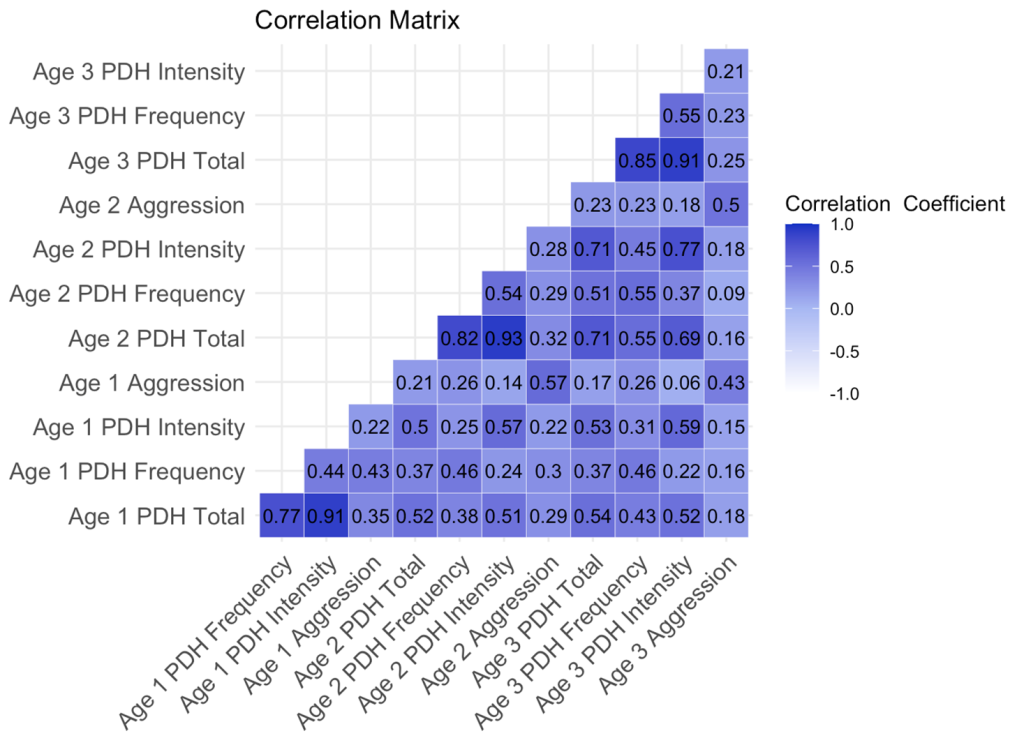In this blog, Sherry (CoTEDS Undergraduate placement student 2023-24) summarises findings from her placement project investigating the relationship between parenting stress and child behaviour
Background
Navigating parenthood comes with its challenges. New parents face the demands of understanding their baby’s needs, managing a new sleep/feed schedule, as well as adapting to changes in work and family dynamics. Following the COVID-19 pandemic, which triggered a 25% increase in the global prevalence of anxiety and depression (World Health Organisation, 2022), parents have been exposed to more health and financial stressors, further exacerbating household chaos and disruption (Adams et al., 2021; Johnson et al., 2021). Parenting stress has been linked to adverse health outcomes in parents and children (Fang et al., 2022). Research describes a cycle between parenting stress and behavioural problems in children: when children act out, parents experience a higher level of stress, and in turn children may react to their parents’ stress with more aggression (Neece et al., 2012).
Historically, stress research has primarily targeted major life changes and significant stressors (e.g., divorce, loss of a loved one, and major illness), but less research has looked at the everyday challenges of caregiving and how they are related to children’s behaviour (Bornstein, 2019). This project aimed to focus on daily tasks of parenthood that can at times be perceived by parents as stressful, and how this type of stress may be linked with the level of aggression in young children.
The current project
The sample: TEDS and CoTEDS
The Twins Early Development Study (TEDS) is a longitudinal study of twins born in England and Wales between 1994 and 1996 (Lockhart et al., 2023). In 2016, the Children of TEDS (CoTEDS) study was launched to follow the development of TEDS twins’ children. It is the first ever twin study to include data on the parent and child generations from birth, which provides a unique opportunity to explore parent-child associations (Ahmadzadeh et al., 2019).
This project used CoTEDS data to explore associations between parenting stress and aggressive behaviour in young children using data collected when the children were 1, 2, and 3 years old.
Parenting stress was measured at all three waves with the Parenting Daily Hassles scale relating to 12 everyday events that parents encounter (Crnic & Greenberg, 1990). Parents rated the frequency of each occurrence and how hassled each event made them feel. Frequency scores can range from 1-4 and intensity scores can range from 1-5.
Children’s aggressive behaviour was also measured at all three waves by the aggression/defiance scale from the Infant-Toddler Social and Emotional Assessment (Briggs-Gowan & Carter, 1998). These scores can range from 1-5.
What we found
Across all three waves, most parents reported experiencing low to moderate frequency (mean = 2.09) and low to moderate intensity of parenting stress (mean = 1.95). The proportion of parents reporting high stress intensity (intensity score more than or equal to 4) increased after children were 1 year old, which may indicate that parents experience greater pressure as their children grow older (Age 1: 0.25%; Age 2: 2.02%; Age 3: 1.12%).
Most children displayed mild to moderate aggressive behaviour (mean = 2.74).
We looked at correlations between parenting stress and child aggression. At ages 1, 2 and 3, parenting stress was shown to moderately and positively correlate with aggressive behaviour in children. Specifically, the frequency of daily hassles showed stronger correlations with child aggression compared to stress intensity.
Notably, there were no sex differences in levels of aggressive behaviour between boys and girls. Similarly, there were no sex differences in parenting hassles between parents with boys and girls.
Summary and discussion
This project found significant cross-sectional associations between parenting stress and aggressive behaviour in young children. For families with children aged 1-3, the parental stress that comes from daily tasks of parenthood was associated with behavioural problems in children. Notably, the frequency of occurrence showed a stronger association with child behavioural problems compared to perceived intensity, highlighting the cumulative impact of frequent everyday challenges over isolated intense events. These associations did not differ between girls and boys. However, research on older children suggest that as children age boys may be more physically while girls are more indirectly aggressive (Björkqvist, 2018), suggesting that gender differences in behaviour might become more relevant as children get older.
Supporting parents in managing daily challenges may be a target for interventions aiming to mitigate negative effects of home environment stress. Continuing to track these families as children grow older will allow more insights into parent-child interactions and interventions that may help parents manage and reduce these challenges.
Acknowledgements
I would like to thank my supervisors, Dr Tom McAdams and Joanna Bright, for their guidance and support throughout my placement and this project, and all the CoTEDS participants for their contributions.
References
- Adams, E.L. et al. (2021) ‘Parents are stressed! patterns of parent stress across COVID 19’, Frontiers in Psychiatry, 12. doi:10.3389/fpsyt.2021.626456.
- Ahmadzadeh, Y.I. et al. (2019) ‘Children of the Twins Early Development Study (CoTEDS): A children-of-twins study’, Twin Research and Human Genetics, 22(6), pp. 514–522. doi:10.1017/thg.2019.61.
- Björkqvist, K. (2018) ‘Gender differences in aggression’, Current Opinion in Psychology, 19, pp. 39–42. doi:10.1016/j.copsyc.2017.03.030.
- Bornstein, M.H. (2019) Handbook of Parenting. volume 5, the practice of parenting. New York, NY: Routledge.
- Briggs-Gowan, M.J. and Carter, A.S. (1998) ‘Infant-Toddler Social and emotional assessment’, PsycTESTS Dataset [Preprint]. doi:10.1037/t10140-000.
- Covid-19 pandemic triggers 25% increase in prevalence of anxiety and depression worldwide (2022) World Health Organization. Available at: https://www.who.int/news/item/02-03-2022-covid-19-pandemic-triggers-25-increase-in-prevalence-of-anxiety-and-depression-worldwide.
- Crnic, K.A. and Greenberg, M.T. (1990) ‘Parenting Daily Hassles index’, PsycTESTS Dataset [Preprint]. doi:10.1037/t51277-000.
- Fang, Y. et al. (2022) ‘Parent, child, and situational factors associated with Parenting Stress: A Systematic Review’, European Child & Adolescent Psychiatry, 33(6), pp. 1687–1705. doi:10.1007/s00787-022-02027-1.
- Johnson, A.D. et al. (2021) ‘Chaos during the covid‐19 outbreak: Predictors of Household Chaos among low‐income families during a pandemic’, Family Relations, 71(1), pp. 18–28. doi:10.1111/fare.12597.
- Lockhart, C. et al. (2023) ‘Twins Early Development Study (TEDS): A genetically sensitive investigation of mental health outcomes in the mid‐twenties’, JCPP Advances, 3(2). doi:10.1002/jcv2.12154.
- Neece, C.L., Green, S.A. and Baker, B.L. (2012) ‘Parenting stress and child behavior problems: A transactional relationship across time’, American Journal on Intellectual and Developmental Disabilities, 117(1), pp. 48–66. doi:10.1352/1944-7558-117.1.48.




